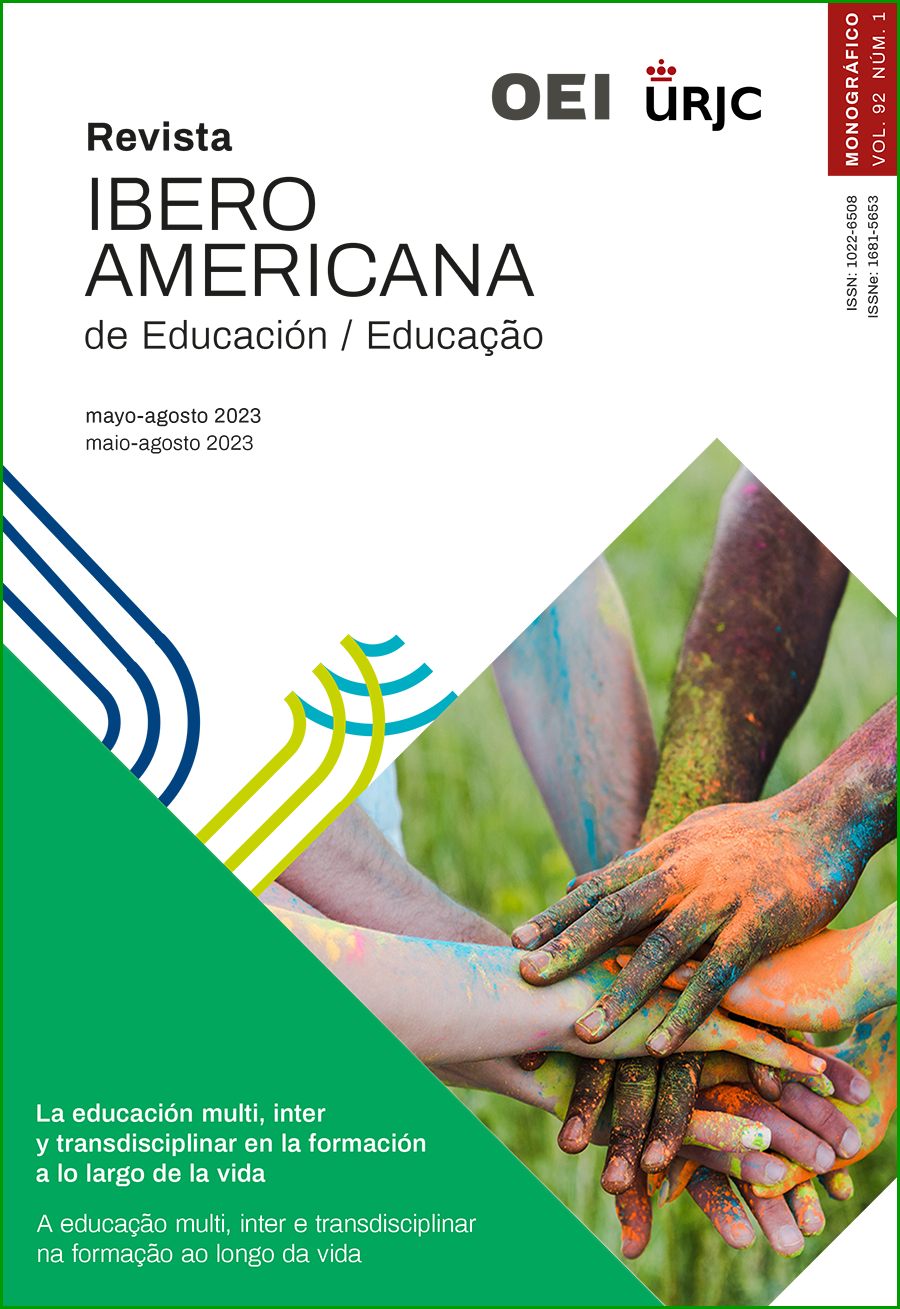STEM education as a transdisciplinary practice in secondary and high school education
DOI:
https://doi.org/10.35362/rie9215804Keywords:
STEM; transdisciplinarity; secondary education; high school educationAbstract
In the current scientific moment, as stated by Caro Saiz et al. (2020), despite the large amount of disciplinary research being carried out, different forms of supradisciplinary research are also emerging, such as multidisciplinarity, interdisciplinarity and transdisciplinarity.
Today's societies go forward very quickly, and education systems do not always evolve at the same rate, which leads to the relevant difficulties in the implementation of new curricula that try to respond to the demands of societies related to these advances. Education must prepare citizens to face future challenges and provide an efficient response to the resolution of complex problems that may arise.
Therefore, this article presents a literature review to address STEM education as a transdisciplinary practice in secondary and high school in the classroom. For this purpose, different databases have been used during the years 2015-2023, specifically WOS (Web of Science) and SCOPUS. This review aims to answer the question of whether the STEM experiences carried out in the classroom have really been designed from a transdisciplinary approach.
Downloads
References
Bernate, J. y Guativa, J. A. V. (2020). Desafíos y tendencias del siglo XXI en la educación superior. Revista de Ciencias Sociales, 26(2), 141-154.
Caro, J., Díaz-de la Fuente, S., Ahedo, V., Zurro, D., Madella, M., Galán, J. M., ... y Olmo, R. D. (2020). Multidisciplinariedad, interdisciplinariedad, transdisciplinariedad. In Terra Incognita [Recurso electrónico]: Libro blanco sobre transdisciplinariedad y nuevas formas de investigación en el Sistema Español de Ciencia y Tecnología (pp. 15-20). PressBooks.
Chu, H. E., Martin, S. N. y Park, J. (2019). A theoretical framework for developing an intercultural STEAM program for Australian and Korean students to enhance science teaching and learning. International Journal of Science and Mathematics Education, 17, 1251-1266. DOI: https://doi.org/10.1007/s10763-018-9922-y
Domènech-Casal, J., Lope, S., y Mora, L. (2019). Qué proyectos STEM diseña y qué dificultades expresa el profesorado de secundaria sobre Aprendizaje Basado en Proyectos. Revista Eureka sobre enseñanza y divulgación de las ciencias, 16(2), 1-16. DOI: https://doi.org/10.25267/Rev_Eureka_ensen_divulg_cienc.2019.v16.i2.2203
Gil, A. C. (2002). Como elaborar projetos de pesquisa (Vol. 4, p. 175). São Paulo: Atlas.
Herro, D. y Quigley, C. (2017). Exploring teachers’ perceptions of STEAM teaching through professional development: implications for teacher educators. Professional Development in Education, 43(3), 416-438. DOI: https://doi.org/10.1080/19415257.2016.1205507
Huang, B., Jong, M. S. Y. y Chai, C. S. (2022). The design and implementation of a video-facilitated transdisciplinary STEM curriculum in the context of COVID-19 pandemic. Educational Technology & Society, 25(1), 108-123.
Huri, N. H. D. y Karpudewan, M. (2019). Evaluating the effectiveness of Integrated STEM-lab activities in improving secondary school students’ understanding of electrolysis. Chemistry Education Research and Practice, 20(3), 495-508. DOI: https://doi.org/10.1039/C9RP00021F
Kelley, T. R. y Knowles, J. G. (2016). A conceptual framework for integrated STEM education. International Journal of STEM education, 3, 1-11. DOI: https://doi.org/10.1186/s40594-016-0046-z
Lin, C. L. y Tsai, C. Y. (2021). The effect of a pedagogical STEAM model on students’ project competence and learning motivation. Journal of Science Education and Technology, 30(1), 112-124. DOI: https://doi.org/10.1007/s10956-020-09885-x
Ortiz-Revilla, J., Sanz-Camarero, R. y Greca-Dufranc, I. M. (2021). Una mirada crítica a los modelos teóricos sobre educación STEAM integrada. Revista Iberoamericana de Educación. https://doi.org/10.35362/rie8724634 DOI: https://doi.org/10.35362/rie8724634
Piña, L. E. y Senior, A. (2020). Estudio de la ciencia, tecnología e innovación desde perspectivas multitécnicas. Revista de Ciencias Sociales (Ve), XXVI(3), 312- 326.
Rupnik, D. y Avsec, S. (2020). Effects of a Transdisciplinary Educational Approach on Students’ Technological Literacy. Journal of Baltic Science Education, 19(1), 121-141. DOI: https://doi.org/10.33225/jbse/20.19.121
Sánchez, D. L. V. y Martínez, A. G. (2021). Educación STEM, un campo de investigación emergente: análisis bibliométrico entre 2010-2020. Investigaçoes em Ensino de Ciencias, 26(3), 195. DOI: https://doi.org/10.22600/1518-8795.ienci2021v26n3p195
Seroy, S. K., Zulmuthi, H. y Grünbaum, D. (2020). Connecting chemistry concepts with environmental context using student-built pH sensors. Journal of Geoscience Education, 68(4), 334-344. DOI: https://doi.org/10.1080/10899995.2019.1702868
Tovar, L. C. Á. y López, A. C. (2021). La importancia del pensamiento complejo y de la transdisciplinariedad para el estudio de las organizaciones. Administración y organizaciones, 24(46), 10-29. DOI: https://doi.org/10.24275/uam/xoc/dcsh/rayo/2021v24n46/Angeles
Urrútia, G. y Bonfill, X. (2010). Declaración PRISMA: una propuesta para mejorar la publicación de revisiones sistemáticas y metaanálisis. Medicina clínica, 135(11), 507-511. DOI: https://doi.org/10.1016/j.medcli.2010.01.015
Zapata, S. A. y Carmona-Mesa, J. A. (2021). Análisis documental sobre la educación STEM/STEAM no formal en la enseñanza de las ciencias y las matemáticas: El caso de Iberoamérica. Revolución en la Formación y la Capacitación para el Siglo XXI, 442.
How to Cite
Published
Issue
Section
License
Any authors who publish with this journal accept the following terms:
















